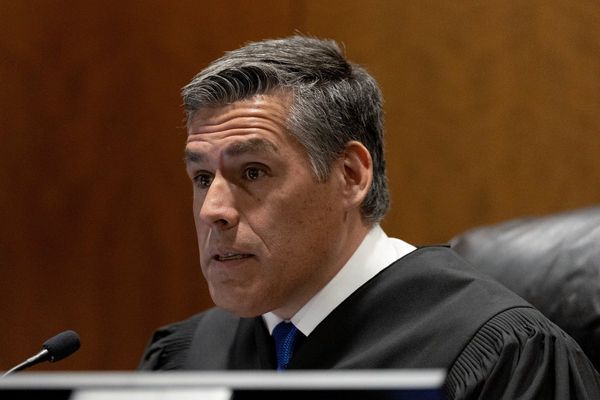
In 1946, Argentina was emerging from military rule, an empowered labour movement was reshaping politics and Col Juan Perón, a leftwing leader who had introduced a raft of popular workers’ rights decrees, was rising fast in the polls. The then US ambassador, Spruille Braden, had other ideas about who should win the national election that year, and he openly campaigned against Perón in Buenos Aires. Braden’s action stands out as one of the most brazen instances of US interference in Argentina’s politics. Until now.
The Argentine president, Javier Milei, who won a resounding midterm victory on Sunday, has received ample support from Donald Trump. Ahead of the congressional elections, Trump endorsed Milei and warned: “If he loses, we are not going to be generous with Argentina.” Washington extended a $20bn currency swap line to the government – money aimed at stabilising financial volatility that would have undermined Milei’s chances. The US treasury even intervened directly, buying more than a billion dollars of pesos to slow the currency’s freefall in recent weeks.
Trump’s bailout of Argentina is not an act of economic prudence (economists across the spectrum say it makes no sense), but of ideological finance. The goal is to shore up an ally in the US’s back yard and discredit opponents, especially the leftwing Perónist tendency in Argentinian politics that Trump equates with his own domestic opponents. Historically, Washington dressed up these types of ideological interventions as serving the greater good, defined in terms of US interests. But Trump has dispensed with even that pretence. For him, foreign policy is not strategic: it’s anchored by personal loyalties.
The US administration has punished Latin American leaders who have dared to resist Trump. Brazil’s government has weathered punitive sanctions against officials in retaliation for prosecuting the former president Jair Bolsonaro, a Trump ally who attempted a coup. The Colombian president, Gustavo Petro, has been personally sanctioned by Scott Bessent’s treasury department. Venezuela faces lethal US strikes on vessels off its coast. The disciplinary message to the region is clear: Washington will use its financial and military power to reward obedience and punish dissent.
For Argentina, this kind of interference has a long pedigree. Braden’s crusade against Juan Perón was also driven by ideological paranoia. Yet the approach failed. Perón’s supporters rallied under the slogan “Braden o Perón”, painting the fight as a stark choice between foreign interference and national sovereignty. Perón won, and his political legacy has defined Argentine politics ever since. He later quipped that if Braden had not existed, “we would have had to invent him”.
Perón’s voters 80 years ago weren’t just motivated by the symbolism of US interference. They voted to reject a political status quo that was deaf to their needs. Likewise, for an electorate exhausted by years of economic and social crises, Milei and Trump’s campaign succeeded by focusing voters’ energies on the failures of the old political establishment.
Still, Milei’s voters had numerous motivations. “A significant portion of Milei’s vote, I would say a little over half of what he obtained, is an electorate that is still hopeful and confident about the future,” says Shila Vilker, director of Argentine pollster firm Trespuntozero. Another significant chunk were concerned that US financial assistance would be conditional on the election’s results. Some were scared of the unknown, others wanted to reject Perónism.
Having won the election, Milei’s challenge will now be to manage monetary policy. The government had been burning through reserves to maintain the peso’s value. US assistance was explicitly a stopgap. A temporary influx of dollars will not rescue a programme that is failing its own electorate – and in the longer term, Argentine voters are unlikely to be swayed by foreign patronage.
Trump’s attempts to weaponise foreign policy in the region have often misfired. In Brazil, his assault on democratic institutions helped to bolster the popularity of Luiz Inácio Lula da Silva. In Panama, the government’s deference to American demands over China’s access to the canal has sparked domestic anger. For now, Milei has bucked this trend. He has secured a minority in congress that shields his austerity agenda from legislative vetoes. His symbolic victory was also enormous: he won by a single point in Buenos Aires province, a bastion of Perónism.
That Milei’s libertarian experiment already needs rescuing underscores its failure. Inflation has eased, but austerity has choked growth and gutted subsidies for transport, energy, health and education, making it harder for the country’s poor to make it to the end of the month. Wages are 6% less in real terms than they were just before Milei took office, and a Big Mac costs more in Argentina than in New York. Confidence in the government has plummeted, and belief in a “better future” has fallen from 48% to 34% in 2025.
Trump’s foreign policy is ideological, but it’s also markedly volatile. On Sunday he met with his ideological enemy Lula da Silva, who, despite US tariffs and sanctions, has spiritedly refused to compromise on the prosecution of the former president, Jair Bolsonaro. After months of acrimony, Lula and Trump are now reportedly working to reach a trade agreement. For all Trump’s bluster about friendship, his interventions lay bare a truth that Latin America has long understood: Washington’s priorities seldom align with the needs of those who live with their consequences.
• Jordana Timerman is a journalist based in Buenos Aires; she edits the Latin America Daily Briefing
Do you have an opinion on the issues raised in this article? If you would like to submit a response of up to 300 words by email to be considered for publication in our letters section, please click here.







